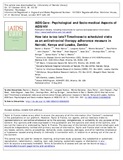| dc.contributor.author | Blacher, RJ | |
| dc.contributor.author | Muiruri, P | |
| dc.contributor.author | Njobvu, L | |
| dc.contributor.author | Mutsotso, W | |
| dc.contributor.author | Potter, D | |
| dc.contributor.author | Ong'ech, J | |
| dc.contributor.author | Mwai, P | |
| dc.contributor.author | Degroot, A | |
| dc.contributor.author | Zulu, I | |
| dc.contributor.author | Bolu, O | |
| dc.contributor.author | Stringer, J | |
| dc.contributor.author | Kiarie, J | |
| dc.contributor.author | Weidle, PJ | |
| dc.date.accessioned | 2013-06-12T11:53:31Z | |
| dc.date.available | 2013-06-12T11:53:31Z | |
| dc.date.issued | 2010-11 | |
| dc.identifier.citation | AIDS Care. 2010 Nov;22(11):1323-31. | en |
| dc.identifier.uri | http://www.ncbi.nlm.nih.gov/pubmed/20711886 | |
| dc.identifier.uri | http://erepository.uonbi.ac.ke:8080/xmlui/handle/123456789/32245 | |
| dc.description.abstract | Collecting self-reported data on adherence to highly active antiretroviral therapy (HAART) can be complicated by patients' reluctance to report poor adherence. The timeliness with which patients attend visits might be a useful alternative to estimate medication adherence. Among Kenyan and Zambian women receiving twice daily HAART, we examined the relationship between self-reported pill taking and timeliness attending scheduled visits. We analyzed data from 566 Kenyan and Zambian women enrolled in a prospective 48-week HAART-response study. At each scheduled clinic visit, women reported doses missed over the preceding week. Self-reported adherence was calculated by summing the total number of doses reported taken and dividing by the total number of doses asked about at the visit attended. A participant's adherence to scheduled study visits was defined as "on time" if she arrived early or within three days, "moderately late" if she was four-seven days late, and "extremely late/missed" if she was more than eight days late or missed the visit altogether. Self-reported adherence was <95% for 29 (10%) of 288 women who were late for at least one study visit vs. 3 (1%) of 278 who were never late for a study visit (odds ratios [OR] 10.3; 95% confidence intervals [95% CI] 2.9, 42.8). Fifty-one (18%) of 285 women who were ever late for a study visit experienced virologic failure vs. 32 (12%) of 278 women who were never late for a study visit (OR 1.7; 95% CI 1.01, 2.8). A multivariate logistic regression model controlling for self-reported adherence found that being extremely late for a visit was associated with virologic failure (OR 2.0; 95% CI 1.2, 3.4). Timeliness to scheduled visits was associated with self-reported adherence to HAART and with risk for virologic failure. Timeliness to scheduled clinic visits can be used as an objective proxy for self-reported adherence and ultimately for risk of virologic failure. | en |
| dc.language.iso | en | en |
| dc.publisher | Univesity of Nairobi | en |
| dc.title | How late is too late? Timeliness to scheduled visits as an antiretroviral therapy adherence measure in Nairobi, Kenya and Lusaka, Zambia. | en |
| dc.type | Article | en |
| local.publisher | Department of Medicine | en |


